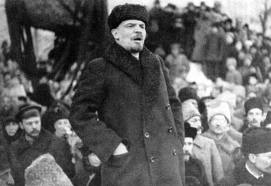Pre-Revolutionary Russia
- Up until 1905, Czar Nicolas II had managed to contain the forces of change

- The failure of Russia in the Russo-Japanese war increased the general desire for reform
- Bloody Saturday in 1905 only led to more protests in both the cities and the countryside
- With the army tied up fighting the Japanese, the state simply did not have the sources to suppress the protests
- Nicolas II did not know how to respond- did not want to grant concessions nor constitutional monarchy
- October Manifesto- a period of constitutional rule in Russia and the basis for the 1906 Constitution
- As Revolutionary agitation died from the October Manifesto and Constitution, the Czar began to reconsider his position on reform.
- He limited votes to only Land Owners
RISE OF LENIN
- Socialism was the major ideological attraction for many Russians
- Lenin (1870-1924) became the leader of the second generation of Marxist
- He came from a middle class home
- Brother was killed by the Czarist authorities in 1887 for being a member of the Social Revolutionary terrorist group
- Lenin devoted himself to radical change and was convinced that the existing system was backwards
- Graduated St. Petersburg University and in 1885 joined the Marxist group
- After living outside Russia, he returned and was arrested and exiled to Siberia (1897-1900)
- Life was not difficult, lived in comfort, studied and wrote
- Upon his release he left Russia and joined fellow members of the Social Democratic Party abroad
- Realized that a revolution could only be completed by a careful organization
- Insisted that a tight well disciplined group of people was needed to lead the revolution on behalf of the proletariat
- A revolution could be made by “vanguard of the proletariat” acting in the name of the whole
- Supporters of Lenin were called “Bolsheviks”
- During the war, Lenin was in exile in Switzerland—-things looked hopeless and they had little support nor money.
- RUSSIA AT WAR
- The war went bad for Russia—little support from Britain and France because of geographical restrictions
- 20th century of warfare-mechanized, supplies, weapons and food had to be moved over great distances quickly
- Czar failed to do this….mobilization of troops was slow, food shortages were present and soldiers were badly supplied
- Ravages of war brought home the weaknesses of the Czar
- Nicolas II in 1915 moved to the front to take control of the army leaving his wife Alexandria in charge
Rasputin
- Monk who was able to care for their hemophilia son
- Along with Alexandria they controlled the government
- December 1916, he was assassinated by a group of Nobles— however, nothing changed after his death
- In 1917, Czar Nicolas II was fighting for his survival unable to govern the court that was corrupt and isolated
- His Generals did not have the means to carry out a successful campaign
- By now the troops on the front were tired of fighting and lacking supplies began to defect
MARCH REVOLUTION
- March 1917, riots broke out in Petrograd because of food shortages but it quickly spread to the factories and army
- Questioned whether the Czar could keep order
- Finding himself with little support (after the Duma asked him to abdicate the throne) he vacated assuming his brother Michael would replace him but he refused
- Provisional government was set up by the Duma led by Kerensky (1881-1970)
- Lenin learned of the Revolution and returned to Petrograd
- Initially the Bolsheviks were supporting Kerensky’s government but Lenin regarded this as a mistake (war should not be continued)
NOVEMBER 1917 REVOLUTION
- Military and internal situation deteriorated
- Kerensky weathered the storm but only with the help of the Soviets
- Trotsky and Lenin were gaining favour with the people
- Bolsheviks carried out a successful coup and thereby gained control of Russia
- Provisional government collapsed and Kerensky fled into exile
- It was not a very bloody revolution
LENIN RUSSIA
- Held a democratic election in which the Bolsheviks were the minority to the Social Revolutionaries Party—represented the needs of the peasants
- Lenin would not tolerate another center of power and when the assembly tried to meet, troops under the orders of the Bolsheviks dissolved the meeting
- Trotsky was sent to negotiate with the Germans
- March 15, 1917 the Treaty of Brest-Litovsk was signed
- Russia gave up 20 % of its territory, 75% of Coal mines and the Ukraine
- Lenin moved to Moscow
- Civil war broke out between the Reds (Bolsheviks) and the Whites (mixed group that hated Lenin)
- Trotsky organized the army and at one point held off their enemies at 16 different points (BR, CAN, US, JAPAN)
- Bolsheviks changed to the Communist Party in 1918
- Main task was to change the lifestyle of the Russian people
- In 1924, Russia became known as the UNION OF SOVIET SOCIALISTS REPUBLIC
- Hence the state recognized the language and cultural differences
- Hoped to maintain Russia by unity by giving each group some autonomy while retaining central control
